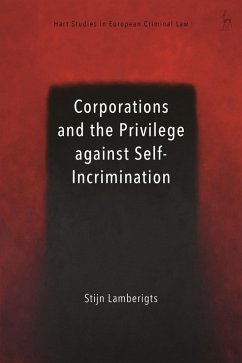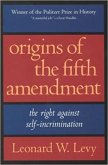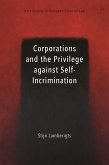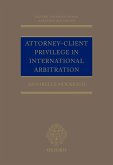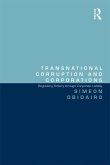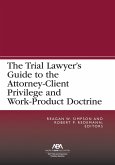Stijn Lamberigts
Corporations and the Privilege against Self-Incrimination (eBook, ePUB)
34,95 €
34,95 €
inkl. MwSt.
Sofort per Download lieferbar

17 °P sammeln
34,95 €
Als Download kaufen

34,95 €
inkl. MwSt.
Sofort per Download lieferbar

17 °P sammeln
Jetzt verschenken
Alle Infos zum eBook verschenken
34,95 €
inkl. MwSt.
Sofort per Download lieferbar
Alle Infos zum eBook verschenken

17 °P sammeln
Stijn Lamberigts
Corporations and the Privilege against Self-Incrimination (eBook, ePUB)
- Format: ePub
- Merkliste
- Auf die Merkliste
- Bewerten Bewerten
- Teilen
- Produkt teilen
- Produkterinnerung
- Produkterinnerung

Bitte loggen Sie sich zunächst in Ihr Kundenkonto ein oder registrieren Sie sich bei
bücher.de, um das eBook-Abo tolino select nutzen zu können.
Hier können Sie sich einloggen
Hier können Sie sich einloggen
Sie sind bereits eingeloggt. Klicken Sie auf 2. tolino select Abo, um fortzufahren.

Bitte loggen Sie sich zunächst in Ihr Kundenkonto ein oder registrieren Sie sich bei bücher.de, um das eBook-Abo tolino select nutzen zu können.
This book asks whether the well-established privilege against self-incrimination applies to corporations, whether it should, and if so, to what extent. Those questions have an increasingly important EU criminal law dimension. To answer them, this study draws on comparative insights from Belgium, England and Wales, and the US; as well as case law of the ECtHR and EU Law. It covers the established CJEU case law in competition cases, the recent CJEU ruling in DB v Consob and addresses Directive (EU) 2016/343. It will appeal to scholars of EU criminal law, but also to white-collar and competition practitioners.…mehr
- Geräte: eReader
- mit Kopierschutz
- eBook Hilfe
- Größe: 0.69MB
Andere Kunden interessierten sich auch für
![The Privilege of Silence (eBook, ePUB) The Privilege of Silence (eBook, ePUB)]() Steven M. SalkyThe Privilege of Silence (eBook, ePUB)69,95 €
Steven M. SalkyThe Privilege of Silence (eBook, ePUB)69,95 €![Origins of the Fifth Amendment: The Right Against Self-Incrimination (eBook, ePUB) Origins of the Fifth Amendment: The Right Against Self-Incrimination (eBook, ePUB)]() Leonard W. LevyOrigins of the Fifth Amendment: The Right Against Self-Incrimination (eBook, ePUB)9,49 €
Leonard W. LevyOrigins of the Fifth Amendment: The Right Against Self-Incrimination (eBook, ePUB)9,49 €![The External Dimension of the EU's Policy against Trafficking in Human Beings (eBook, ePUB) The External Dimension of the EU's Policy against Trafficking in Human Beings (eBook, ePUB)]() Chloé BrièreThe External Dimension of the EU's Policy against Trafficking in Human Beings (eBook, ePUB)36,95 €
Chloé BrièreThe External Dimension of the EU's Policy against Trafficking in Human Beings (eBook, ePUB)36,95 €![Corporations and the Privilege against Self-Incrimination (eBook, PDF) Corporations and the Privilege against Self-Incrimination (eBook, PDF)]() Stijn LamberigtsCorporations and the Privilege against Self-Incrimination (eBook, PDF)34,95 €
Stijn LamberigtsCorporations and the Privilege against Self-Incrimination (eBook, PDF)34,95 €![Attorney-Client Privilege in International Arbitration (eBook, ePUB) Attorney-Client Privilege in International Arbitration (eBook, ePUB)]() Annabelle MöckeschAttorney-Client Privilege in International Arbitration (eBook, ePUB)82,95 €
Annabelle MöckeschAttorney-Client Privilege in International Arbitration (eBook, ePUB)82,95 €![Transnational Corruption and Corporations (eBook, ePUB) Transnational Corruption and Corporations (eBook, ePUB)]() Simeon ObidairoTransnational Corruption and Corporations (eBook, ePUB)41,95 €
Simeon ObidairoTransnational Corruption and Corporations (eBook, ePUB)41,95 €![The Trial Lawyer's Guide to the Attorney-Client Privilege and Work-Product Doctrine (eBook, ePUB) The Trial Lawyer's Guide to the Attorney-Client Privilege and Work-Product Doctrine (eBook, ePUB)]() The Trial Lawyer's Guide to the Attorney-Client Privilege and Work-Product Doctrine (eBook, ePUB)96,95 €
The Trial Lawyer's Guide to the Attorney-Client Privilege and Work-Product Doctrine (eBook, ePUB)96,95 €-
-
-
This book asks whether the well-established privilege against self-incrimination applies to corporations, whether it should, and if so, to what extent. Those questions have an increasingly important EU criminal law dimension. To answer them, this study draws on comparative insights from Belgium, England and Wales, and the US; as well as case law of the ECtHR and EU Law. It covers the established CJEU case law in competition cases, the recent CJEU ruling in DB v Consob and addresses Directive (EU) 2016/343. It will appeal to scholars of EU criminal law, but also to white-collar and competition practitioners.
Produktdetails
- Produktdetails
- Verlag: Bloomsbury eBooks UK
- Seitenzahl: 304
- Erscheinungstermin: 29. Dezember 2022
- Englisch
- ISBN-13: 9781509953325
- Artikelnr.: 67059947
- Verlag: Bloomsbury eBooks UK
- Seitenzahl: 304
- Erscheinungstermin: 29. Dezember 2022
- Englisch
- ISBN-13: 9781509953325
- Artikelnr.: 67059947
- Herstellerkennzeichnung Die Herstellerinformationen sind derzeit nicht verfügbar.
Dr. Stijn Lamberigts is an attorney at Lydian and member of the Brussels Bar, Belgium, as well as a senior affiliated researcher at the Institute of Criminal Law (KU Leuven).
1. Introduction
I. Corporate Offenders and Procedural Safeguards
II. Corporations, Punitive Cases and the Privilege against
Self-Incrimination
III. Structure and Methodology
2. The Roots and Historical Rationale(s) of the Privilege against
Self-Incrimination
I. Nemo Tenetur Prodere Seipsum
II. The Oath ex Officio
III. Torture
IV. Consolidation of the Privilege against Self-Incrimination
V. The Missing Piece of the Puzzle?
VI. Applying the Historical Rationales to Corporations
3. How Different Are Corporations for the Purpose of the Privilege against
Self-Incrimination?
I. Corporate Personhood
II. (Im)possibility of Exerting Physical or Psychological Pressure on
Corporations
III. Importance of Documentary Evidence
IV. Impossibility of Exercising the Privilege against Self-Incrimination
Independently
V. Comparable Categories
VI. Legitimate Aim
VII. Objective Criterion of Distinction
VIII. Suitability and Necessity
IX. Proportionality Sensu Stricto
4. Contemporary Rationales of the Privilege against Self-Incrimination
I. Protection from Cruel Choices
II. The Protection of the Innocent
III. The Privilege against Self-Incrimination and the Presumption of
Innocence
IV. Privacy Protection
5. Self-Incrimination
6. Compulsion
I. Compulsion by Public Authorities
II. Permitted Compulsion
III. Adverse Inferences
IV. Private Compulsion
7. The Privilege against Self-Incrimination and Different Types of Evidence
I. Oral Statements
II. Documentary Evidence
III. Encrypted Evidence
8. The Applicability of the Privilege against Self-Incrimination Ratione
Temporis
9. Waiver of the Privilege against Self-Incrimination
10. Corporations and the Privilege against Self-Incrimination
I. (Supra)national Models of Corporate Criminal Liability
II. Corporations and the Privilege against Self-Incrimination
III. Linking Models of Corporate Criminal Liability to the (Un)availability
of a Corporate Privilege against Self-Incrimination
IV. The Cooperating Corporation
11. A Proposal for a Balanced Corporate Privilege against
Self-Incrimination
I. Different Models of a Corporate Privilege against Self-Incrimination
II. A Proposal for a Balanced Corporate Privilege against
Self-Incrimination
12. Overall Conclusion
I. Corporate Offenders and Procedural Safeguards
II. Corporations, Punitive Cases and the Privilege against
Self-Incrimination
III. Structure and Methodology
2. The Roots and Historical Rationale(s) of the Privilege against
Self-Incrimination
I. Nemo Tenetur Prodere Seipsum
II. The Oath ex Officio
III. Torture
IV. Consolidation of the Privilege against Self-Incrimination
V. The Missing Piece of the Puzzle?
VI. Applying the Historical Rationales to Corporations
3. How Different Are Corporations for the Purpose of the Privilege against
Self-Incrimination?
I. Corporate Personhood
II. (Im)possibility of Exerting Physical or Psychological Pressure on
Corporations
III. Importance of Documentary Evidence
IV. Impossibility of Exercising the Privilege against Self-Incrimination
Independently
V. Comparable Categories
VI. Legitimate Aim
VII. Objective Criterion of Distinction
VIII. Suitability and Necessity
IX. Proportionality Sensu Stricto
4. Contemporary Rationales of the Privilege against Self-Incrimination
I. Protection from Cruel Choices
II. The Protection of the Innocent
III. The Privilege against Self-Incrimination and the Presumption of
Innocence
IV. Privacy Protection
5. Self-Incrimination
6. Compulsion
I. Compulsion by Public Authorities
II. Permitted Compulsion
III. Adverse Inferences
IV. Private Compulsion
7. The Privilege against Self-Incrimination and Different Types of Evidence
I. Oral Statements
II. Documentary Evidence
III. Encrypted Evidence
8. The Applicability of the Privilege against Self-Incrimination Ratione
Temporis
9. Waiver of the Privilege against Self-Incrimination
10. Corporations and the Privilege against Self-Incrimination
I. (Supra)national Models of Corporate Criminal Liability
II. Corporations and the Privilege against Self-Incrimination
III. Linking Models of Corporate Criminal Liability to the (Un)availability
of a Corporate Privilege against Self-Incrimination
IV. The Cooperating Corporation
11. A Proposal for a Balanced Corporate Privilege against
Self-Incrimination
I. Different Models of a Corporate Privilege against Self-Incrimination
II. A Proposal for a Balanced Corporate Privilege against
Self-Incrimination
12. Overall Conclusion
1. Introduction
I. Corporate Offenders and Procedural Safeguards
II. Corporations, Punitive Cases and the Privilege against
Self-Incrimination
III. Structure and Methodology
2. The Roots and Historical Rationale(s) of the Privilege against
Self-Incrimination
I. Nemo Tenetur Prodere Seipsum
II. The Oath ex Officio
III. Torture
IV. Consolidation of the Privilege against Self-Incrimination
V. The Missing Piece of the Puzzle?
VI. Applying the Historical Rationales to Corporations
3. How Different Are Corporations for the Purpose of the Privilege against
Self-Incrimination?
I. Corporate Personhood
II. (Im)possibility of Exerting Physical or Psychological Pressure on
Corporations
III. Importance of Documentary Evidence
IV. Impossibility of Exercising the Privilege against Self-Incrimination
Independently
V. Comparable Categories
VI. Legitimate Aim
VII. Objective Criterion of Distinction
VIII. Suitability and Necessity
IX. Proportionality Sensu Stricto
4. Contemporary Rationales of the Privilege against Self-Incrimination
I. Protection from Cruel Choices
II. The Protection of the Innocent
III. The Privilege against Self-Incrimination and the Presumption of
Innocence
IV. Privacy Protection
5. Self-Incrimination
6. Compulsion
I. Compulsion by Public Authorities
II. Permitted Compulsion
III. Adverse Inferences
IV. Private Compulsion
7. The Privilege against Self-Incrimination and Different Types of Evidence
I. Oral Statements
II. Documentary Evidence
III. Encrypted Evidence
8. The Applicability of the Privilege against Self-Incrimination Ratione
Temporis
9. Waiver of the Privilege against Self-Incrimination
10. Corporations and the Privilege against Self-Incrimination
I. (Supra)national Models of Corporate Criminal Liability
II. Corporations and the Privilege against Self-Incrimination
III. Linking Models of Corporate Criminal Liability to the (Un)availability
of a Corporate Privilege against Self-Incrimination
IV. The Cooperating Corporation
11. A Proposal for a Balanced Corporate Privilege against
Self-Incrimination
I. Different Models of a Corporate Privilege against Self-Incrimination
II. A Proposal for a Balanced Corporate Privilege against
Self-Incrimination
12. Overall Conclusion
I. Corporate Offenders and Procedural Safeguards
II. Corporations, Punitive Cases and the Privilege against
Self-Incrimination
III. Structure and Methodology
2. The Roots and Historical Rationale(s) of the Privilege against
Self-Incrimination
I. Nemo Tenetur Prodere Seipsum
II. The Oath ex Officio
III. Torture
IV. Consolidation of the Privilege against Self-Incrimination
V. The Missing Piece of the Puzzle?
VI. Applying the Historical Rationales to Corporations
3. How Different Are Corporations for the Purpose of the Privilege against
Self-Incrimination?
I. Corporate Personhood
II. (Im)possibility of Exerting Physical or Psychological Pressure on
Corporations
III. Importance of Documentary Evidence
IV. Impossibility of Exercising the Privilege against Self-Incrimination
Independently
V. Comparable Categories
VI. Legitimate Aim
VII. Objective Criterion of Distinction
VIII. Suitability and Necessity
IX. Proportionality Sensu Stricto
4. Contemporary Rationales of the Privilege against Self-Incrimination
I. Protection from Cruel Choices
II. The Protection of the Innocent
III. The Privilege against Self-Incrimination and the Presumption of
Innocence
IV. Privacy Protection
5. Self-Incrimination
6. Compulsion
I. Compulsion by Public Authorities
II. Permitted Compulsion
III. Adverse Inferences
IV. Private Compulsion
7. The Privilege against Self-Incrimination and Different Types of Evidence
I. Oral Statements
II. Documentary Evidence
III. Encrypted Evidence
8. The Applicability of the Privilege against Self-Incrimination Ratione
Temporis
9. Waiver of the Privilege against Self-Incrimination
10. Corporations and the Privilege against Self-Incrimination
I. (Supra)national Models of Corporate Criminal Liability
II. Corporations and the Privilege against Self-Incrimination
III. Linking Models of Corporate Criminal Liability to the (Un)availability
of a Corporate Privilege against Self-Incrimination
IV. The Cooperating Corporation
11. A Proposal for a Balanced Corporate Privilege against
Self-Incrimination
I. Different Models of a Corporate Privilege against Self-Incrimination
II. A Proposal for a Balanced Corporate Privilege against
Self-Incrimination
12. Overall Conclusion
